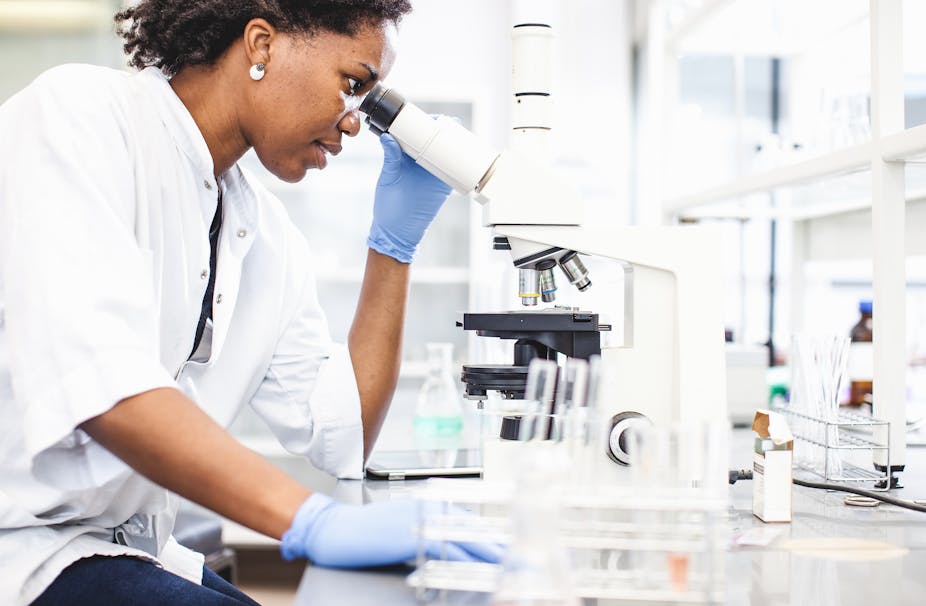Africa bears a disproportionately high burden of globally significant diseases. But the continent has lagged in knowledge production to address its health challenges.
There are a number of factors that contribute to this. These include the absence of a critical mass of researchers even where pockets of excellence exist. Progression pathways for those in scientific careers are very weak. Scientists have limited access to scientific publications and research support services. And legacies of colonialism – such as funding and publishing structures – continue to favour Northern-based researchers.
The problems facing researchers in Africa can often lead to a “brain-drain” and perpetuate inadequate training environments. It is estimated that one in every three African scientists leave the continent every year.
Financial investments have been made to develop scientific capacity on the continent. Although local sources have contributed, the majority of funding originated from the global north. There have been numerous capacity-building programmes using different approaches and with different levels of success. These efforts have contributed to major improvements.
But most of these programmes have been driven from outside the continent. This does not bode well for the development of sustainable African-led knowledge production pipelines. These pipelines would lead to local economic benefits or sustainability of these activities within local socioeconomic frameworks.
Major international funders are starting to appreciate the importance of shifting capacity-building efforts towards more African-led models. An example of this is the DELTAS Africa Initiative. It is funded by northern partners but implemented by the African Academy of Sciences’ Alliance for Accelerating Excellence in Science in Africa.
Our organisation, the sub-Saharan African Network for TB/HIV Research Excellence (SANTHE), is one of the consortia funded by the initiative. Our work since 2015 suggests that African-led capacity building is successful and is the ideal route to make sustainable changes.
For example, we performed high quality research which resulted in 119 publications in leading international journals. Our research also resulted in public health policy impact. We built a strong research management network with several managers offered professional training opportunities.
In addition to this, we expanded our community and public engagement efforts and received over US$120,000 in additional grants. We used a number of tools to support our scientific capacity building efforts. These include awarding path-to-independence awards of $100,000 each to five emerging research leaders. We also awarded 15 collaborative research grants of $50,000 each.
African-led capacity building is crucial
Scientific health research efforts and capacity on the continent will not become sustainable without Africans increasingly taking a leading role. Africans are best placed to identify the most relevant and pressing local problems. This should inform the development of national and international partnerships tasked with developing and leading research agendas. The current COVID-19 pandemic highlights the need for local research capacity. The epidemic on the African continent seems distinct from other regions and may require unique solutions.
The immediate benefits of African-led efforts for African researchers are enhanced local ownership of activities and new opportunities for sustained skills building of staff and trainees. These will hopefully lead to improved research outputs. Examples of this could include increased numbers of African-led first and senior author publications. When research is led by African scientists, findings are more likely to be communicated in a culturally appropriate and context specific way. In addition, African-led efforts increase opportunities for senior scientists to act as role models and mentors. This could also increase the visibility of African scientists and facilitate South-South collaborations. Overall this would help strengthen African scientific institutions. At SANTHE we reaped all these benefits.
Through our SANTHE activities we have identified three key target areas required to build scientific capacity in Africa. The first is to directly empower African-based researchers. The second is to offer high quality training to junior African scientists and support staff. Knowledge and skills development is crucial to allow each person to reach their true potential and perform at the highest level. Thirdly, effective information exchange and collaboration is essential for success. Scientists need opportunities to exchange ideas and information and obtain critical feedback on their work. Collaborating can facilitate novel scientific projects.
There are still many challenges to overcome. Continued and sustainable funding support is still necessary to support African-led capacity building. External scientific support and collaboration is also essential.
Alternative funding mechanisms must also be encouraged. Examples include local philanthropies and through local tax payers. African governments are making increased investments in science. But sub-Saharan Africa still lags behind other global regions. On average sub-Saharan Africa spends 0.4% of GDP on research and experimental development compared to 2.5% by North America and Western Europe. A target of 1% of GDP invested in research and development was set by the African Union. South Africa and Kenya are approaching this 2025 target and are currently investing around 0.8% of GDP.
Way forward
It is clear that long-term investment from international donors and increasing funding commitments from African governments and philanthropies are needed.
With this funding the continent can realise a critical mass of local capacity and create and sustain world-class research hubs. Then the region’s intractable health challenges can be addressed. African-led research must eventually translate into African-funded research and capacity building.

